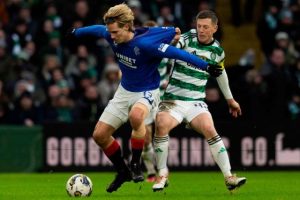
Before football became an early casualty of war, John Divers scored the final goal for Celtic
Celtic family links have been hugely popular this weekend, with Hoops-daft Luke McCowan making his first appearance for the club in yesterday’s overwhelming victory.

As part of my research for my upcoming article about Celtics in the 1930s, I had the pleasure and luxury of speaking with various family members of players from that era. These include relatives of John Divers, Bobby Hogg, Frank Murphy, and Peter Scarff. They all have great stories to share and are understandably proud of their famous relatives.
Barry Divers is the son of John, who played for Jimmy McGrory and then Jock Stein, and the grandson of the same name, who played in Willie Maley’s great sides in the late 1930s and under Jimmy McStay during World War II. So Barry’s father and grandpa worked for Celtic’s first four managers. That’s quite the record. To be thorough, I should probably mention that Patsy Gallacher was John senior’s maternal uncle. It’s not a horrible bloodline, Barry.
Barry revealed to me previously that on this day in 1939, his grandfather John Divers scored Celtic’s final goal before League football was suspended due to the outbreak of war, which had begun 24 hours earlier.
Below is an excerpt from the new book that discusses that historic weekend.
I hope you enjoyed it.
More information on the book will be available shortly. Keep an eye on this space!
Before football became an early casualty of war, John Divers scored the final goal for Celtic.
Malcolm MacDonald and traveling reserve George Paterson were forced to withdraw from the Scottish League squad’s midweek trip to Belfast due to injuries. Scotland would win by the odd goal in five

The match was played while efforts to evacuate 250,000 ‘children, mothers, and assistants’ from Scotland’s heavily populated districts began on September 1st, with the official line being that this was strictly precautionary and that war was not inevitable. Those were meaningless words, since Hitler’s attack on Poland, consisting of a ground invasion and an aerial bombardment, commenced on the same day. The Westminster administration responded clearly, stating that unless Germany withdrew promptly from such attacks, Britain would use action to defend their Polish friends. With no such guarantees, Britain and France went to war with Germany.
Despite the fact that football is periodically cancelled nowadays, the entire Scottish League schedule went forward as planned on Saturday, September 2, 1939. Celtic hosted east end neighbours Clyde, with Willie Maley making four changes from the win over Cowdenbeath seven days earlier for what would prove to be a momentous match.
With Jock Morrison away, former Shawfield Juniors left-back John Kelly became the second player with the same name to make his Celtic debut in a row. Hugh O’Neill took over at centre-half for Willie Lyon, while George Paterson returned alongside him and Matt Lynch moved up to outside-right in place of Johnny Kelly, who made his debut last week. Malcolm MacDonald returned to partner Lynch on the right flank, with Oliver Anderson missing out; the full Celtic line-up is as follows.

Given Celtic’s injury issues, which dated back as far as any supporter could recall, another encounter in Glasgow that left several of their stars limping on the touchline as the game continued was perhaps the last thing they needed on a sweltering afternoon. John Crum, John Divers, Malcolm MacDonald, and George Paterson all served on this unwelcome duty, but it was Celts who took both points, with John Divers scoring the only goal of the game two minutes after the restart, his low shot eluding Clyde goalkeeper Peter McArthur and full-back Jimmy Hickie on the line. Celts would now be part of a quartet of clubs with six points from the five matches played—Hearts
It wasn’t known at the time, but Joe Kennaway’s clean sheet against Clyde that afternoon would be his final gift to Celtic. The Canadian who arrived at Celtic Park in the most terrible of circumstances eight years ago would never play for the club again. Within 24 hours of these matches, the SFA notified its member clubs that the players’ contracts would be automatically revoked. This followed a government order that closed ‘all places of entertainment and outdoor sport.’ The SFA later stated that professional player registrations would remain valid in the meantime, but that “all contracts or agreements between clubs and players have been suspended as of 3 September 1939.”
Leave a Reply